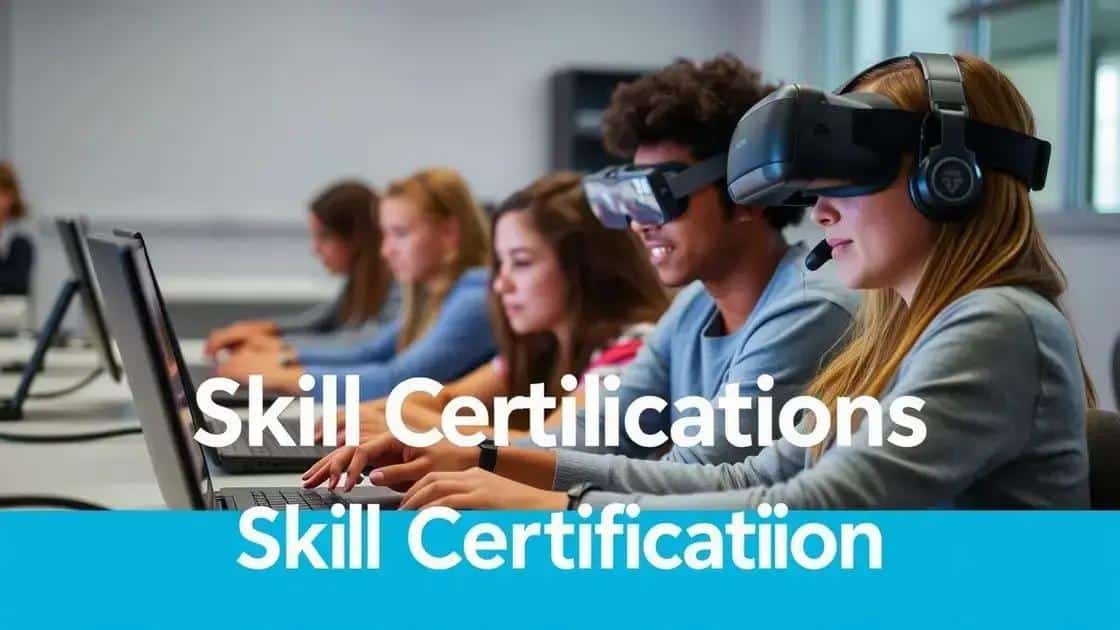Student skill certifications trends: what you need to know

Student skill certifications enhance employability by validating expertise, aligning skills with industry needs, and significantly impacting hiring decisions in a competitive job market.
Student skill certifications trends are becoming increasingly relevant in today’s job market. They offer a way for individuals to stand out and showcase their abilities to employers. Have you ever wondered how these certifications can open new doors for your career?
Understanding the importance of student skill certifications
When it comes to launching a successful career, student skill certifications play a crucial role. They not only enhance a student’s resume but also provide valuable skills that employers seek. In today’s competitive job market, having the right certifications can make all the difference.
Why Certifications Matter
Firstly, certifications validate your skills and knowledge in a specific area. This means you can demonstrate your competency to potential employers without them having to guess. Additionally, many employers now recognize certified candidates as more trustworthy and committed.
Key Benefits of Skill Certifications
- Increased job opportunities
- Higher earning potential
- Greater confidence in your abilities
- Networking opportunities with industry professionals
Moreover, these certifications help you stay current with industry trends. Continuous learning is essential, and certifications encourage ongoing education. By keeping your skills updated, you increase your marketability.
A student skill certification can also lead to personal growth. Beyond just the technical skills, certifications often require you to develop soft skills such as communication and problem-solving. These are vital in any workplace environment.
How Employers View Certifications
Employers generally view certifications as a positive trait. They know that certified candidates are dedicated to their professional development. This often translates into better performance on the job. In many cases, having relevant certifications can even set you apart from others with similar educational backgrounds.
Furthermore, certifications can open doors to new professional networks. Many certification programs offer alumni associations or community groups, providing opportunities to connect with others in your field. This can lead to job referrals and collaborations.
In summary, recognizing the importance of student skill certifications is vital for any aspiring professional. They offer numerous advantages that can significantly enhance your career journey.
Emerging trends in skill certifications for students

In recent years, emerging trends in skill certifications for students have gained significant traction. As industries rapidly evolve, the demand for new skills becomes essential. Staying updated with these trends can greatly enhance a student’s employability and career prospects.
Online Learning and Micro-Credentials
One major trend is the rise of online learning platforms offering micro-credentials. These bite-sized certifications allow students to learn specific skills quickly. Platforms like Coursera and edX provide courses that focus on practical knowledge.
- Allows flexibility in learning
- Focuses on in-demand skills
- Cost-effective compared to traditional courses
Students can earn these credentials while balancing other commitments, making education more accessible than ever. This trend aligns with the need for lifelong learning in a fast-paced world.
Focus on Soft Skills
Another trend is the heightened emphasis on soft skills. Employers are increasingly valuing traits like communication, teamwork, and problem-solving. Skill certifications now often integrate these competencies as part of their curriculum.
Certifications that combine hard skills with soft skills are becoming standard. This helps prepare students not just technically, but also in how to interact effectively in a team. Adapting to this trend means being more marketable in various job fields.
Additionally, industries are beginning to recognize the importance of diversified skill sets. Many certifications now reflect the interdisciplinary nature of many modern job roles. For instance, tech roles increasingly combine skills in software development, data analysis, and project management.
Industry Partnerships
Furthermore, partnerships between educational institutions and companies are transforming how certifications are designed. These collaborations can lead to certifications that are closely aligned with current industry needs.
- Training programs directly from employers
- Curriculum tailored to job market demands
- Internships or real-world projects included
This trend ensures that students acquire relevant skills that potential employers actively seek, boosting their chances of employment.
By understanding and adapting to these emerging trends in skill certifications, students can better prepare themselves for a competitive job market. Staying informed about these developments is crucial for future success.
How to choose the right certifications
Choosing the right certifications can significantly impact your career. With a variety of options available, it’s important to make informed decisions. First, consider what skills are in demand in your desired field.
Assessing Your Career Goals
Your career goals should guide your choice of certifications. Start by identifying what job roles you aim for. Research the qualifications and skills required in those roles.
In many industries, certifications not only demonstrate your proficiency but also show your commitment to personal growth. Aligning your certifications with your career aspirations is key to making the most of your educational investments.
Researching Industry Standards
Next, research industry standards. Certain certifications hold more value in specific fields. For example, IT professionals often seek certifications from sources like CompTIA or Cisco. Look into which certifications are respected by employers in your targeted industry.
- Check job postings for required certifications
- Consult industry professionals and mentors
- Read reviews and feedback on courses
Networking can also provide insights into the best certifications to pursue. Attend industry meetings or connect on forums where professionals share their experiences.
Evaluating Certification Providers
Another important step is evaluating certification providers. Look for programs that are recognized and respected in your industry. The quality of the education received can vary greatly between providers.
Make sure to check for accredited institutions. Additionally, consider the format of the certification program. Some may offer online options, while others require in-person attendance. Choose one that fits your learning style and schedule.
Finally, take into account the costs associated with each certification. Balancing cost against potential career benefits is essential. A more expensive program may lead to better job opportunities and higher income.
By following these steps, you equip yourself to choose the right certifications that align with your career goals, meet industry standards, and enhance your skills effectively.
The impact of certifications on hiring decisions

The impact of certifications on hiring decisions is significant. Employers are increasingly considering certifications as a key factor when evaluating job candidates. These credentials can differentiate candidates in a crowded job market.
Enhancing Credibility
Having relevant certifications enhances your credibility in the eyes of potential employers. It shows that you have taken the time and effort to acquire specific skills. This commitment can make hiring managers more likely to trust your abilities.
Aligning Skills with Company Needs
Certifications often align closely with the skills companies are looking for. Many job descriptions list specific certifications as a requirement or preference. By holding these certifications, candidates signal that they meet the expectations of the employer.
- Demonstrates expertise in a particular area
- Shows commitment to professional development
- Indicates readiness for job responsibilities
Furthermore, employers may view certifications as a way to reduce training costs. When hiring certified candidates, they can be confident that the individual is already equipped with the essential skills needed for the job. This reduces the time and resources spent on training new hires.
Market Trends and Preferences
In some industries, having certain certifications can even lead to faster promotions or higher starting salaries. Employers often use certifications as a benchmark during salary negotiations. This recognition can boost a candidate’s confidence and the perceived value of their skills in the job market.
Additionally, the specific certifications that employers prioritize can change over time based on market demands. Regularly updating skills and obtaining relevant certifications ensures that candidates remain competitive.
In conclusion, understanding the impact of certifications on hiring decisions can guide individuals in their educational paths. By strategically choosing certifications that align with industry needs and demonstrating their commitment, candidates can significantly improve their chances of securing desirable job positions.
Certifications are essential for students looking to thrive in today’s job market. They offer a way to showcase skills, increase job opportunities, and enhance credibility with employers. As trends evolve, understanding which certifications to pursue can greatly influence career success. By aligning their education with industry demands, students not only become more prepared for the workforce but also increase their chances of landing desirable positions. Investing time in obtaining the right certifications can lead to a rewarding and fulfilling career journey.
FAQ – Frequently Asked Questions about Student Skill Certifications
Why are certifications important for students?
Certifications validate your skills, making you more attractive to employers and increasing your job opportunities in a competitive market.
How do I know which certifications to pursue?
Research industry requirements, align certifications with your career goals, and consult professionals in your field to determine the most valuable certifications.
Can certifications really impact my hiring chances?
Yes, many employers view certifications as a sign of commitment and expertise, which can positively influence hiring decisions.
Are online certifications as valuable as traditional ones?
Yes, many online certifications are recognized and respected by employers, especially when they come from accredited institutions.






